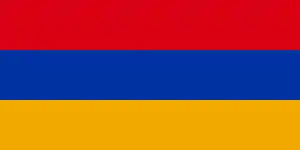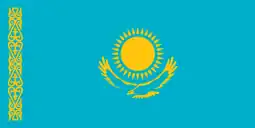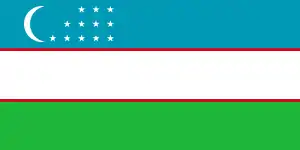1997 Madrid summit
The 1997 Madrid summit was a NATO summit held in Madrid, Spain from 8–9 July 1997. It was the 15th NATO summit and the second in 1997, the previous one being held in Paris. The summit was notable for inviting three new members, Hungary, Poland, and the Czech Republic to join the alliance.
Participants
The official meetings were led by NATO Secretary General Javier Solana. One notable absence from the summit was Boris Yeltsin, President of Russia, which was instead represented by lower level bureaucrats,[1]
In attendance
 Albania – Prime Minister Bashkim Fino
Albania – Prime Minister Bashkim Fino Armenia – Foreign Minister Alexander Arzoumanian
Armenia – Foreign Minister Alexander Arzoumanian Austria – Federal Chancellor Viktor Klima
Austria – Federal Chancellor Viktor Klima Azerbaijan – President Heidar Aliev
Azerbaijan – President Heidar Aliev Belarus – President Alexander Lukashenko
Belarus – President Alexander Lukashenko.svg.png.webp) Belgium – Prime Minister Jean-Luc Dehaene
Belgium – Prime Minister Jean-Luc Dehaene Bulgaria – President Petar Stoyanov
Bulgaria – President Petar Stoyanov.svg.png.webp) Canada – Prime Minister Jean Chrétien
Canada – Prime Minister Jean Chrétien Czech Republic – President Vaclav Havel
Czech Republic – President Vaclav Havel Denmark – Prime Minister Poul Nyrup Rasmussen
Denmark – Prime Minister Poul Nyrup Rasmussen Estonia – President Lennart Meri
Estonia – President Lennart Meri Finland – President Martti Ahtisaari
Finland – President Martti Ahtisaari France – President Jacques Chirac
France – President Jacques Chirac.svg.png.webp) Georgia – President Eduard Shevardnadze
Georgia – President Eduard Shevardnadze Germany – Chancellor Helmut Kohl
Germany – Chancellor Helmut Kohl Greece – Prime Minister Costas Simitis
Greece – Prime Minister Costas Simitis Hungary – Prime Minister Gyula Horn
Hungary – Prime Minister Gyula Horn Iceland – Prime Minister David Oddsson
Iceland – Prime Minister David Oddsson Italy – Prime Minister Romano Prodi
Italy – Prime Minister Romano Prodi Kazakhstan – Ambassador Aoueskhan Kyrbassov
Kazakhstan – Ambassador Aoueskhan Kyrbassov Latvia – President Guntis Ulmanis
Latvia – President Guntis Ulmanis Lithuania – President Algirdas Brazauskas
Lithuania – President Algirdas Brazauskas Luxembourg – Prime Minister Jean-Claude Juncker
Luxembourg – Prime Minister Jean-Claude Juncker Macedonia – President Kiro Gligorov
Macedonia – President Kiro Gligorov Moldova – President Petru Lucinschi
Moldova – President Petru Lucinschi Netherlands – Prime Minister Wim Kok
Netherlands – Prime Minister Wim Kok Norway – Prime Minister Thorbjørn Jagland
Norway – Prime Minister Thorbjørn Jagland Poland – President Aleksander Kwaśniewski
Poland – President Aleksander Kwaśniewski Portugal – Prime Minister António Guterres
Portugal – Prime Minister António Guterres Romania – President Emil Constantinescu
Romania – President Emil Constantinescu Russia – Valerii Serov, Deputy Chairman of Government
Russia – Valerii Serov, Deputy Chairman of Government Slovakia– Prime Minister Vladimír Mečiar
Slovakia– Prime Minister Vladimír Mečiar Slovenia – Prime Minister Janez Drnovšek
Slovenia – Prime Minister Janez Drnovšek Spain – Prime Minister José María Aznar
Spain – Prime Minister José María Aznar Turkey – President Süleyman Demirel
Turkey – President Süleyman Demirel Turkmenistan – Ambassador Tchary Niiazov
Turkmenistan – Ambassador Tchary Niiazov Ukraine – President Leonid Kuchma
Ukraine – President Leonid Kuchma United Kingdom – Prime Minister Tony Blair
United Kingdom – Prime Minister Tony Blair United States – President Bill Clinton
United States – President Bill Clinton Uzbekistan – Minister of Foreign Affairs Abdulaziz Kamilov[2]
Uzbekistan – Minister of Foreign Affairs Abdulaziz Kamilov[2]
Topics
The topic of enlargement was the main focus of the summit. The result of the summit was that Hungary, Poland, and the Czech Republic were invited to join NATO. Fellow Visegrád Group member Slovakia was excluded from this invitation. Slovakia had held a referendum on NATO membership in May 1997, but turnout in the referendum failed to achieve the required 50% of eligible voters and government sabotage was blamed, which in turn was viewed as one of a string of undemocratic measures taken by Prime Minister Vladimír Mečiar.[3] A majority of NATO members reportedly supported France's proposal to also immediately invite Romania and Slovenia as members, but this was strongly opposed by U.S. President Bill Clinton, and even a "iron-clad guarantee" that they could be invited in two years time was watered-down in favor of an "open door" policy for new potential members.[4] A main concern for the United States was the cost of potentially raising the military standards of the new Eastern European members. Estimates put this cost at as much as US$10 billion, which participants worried could lead to the treaty recognizing the new members being rejected by the Republican-held U.S. Senate.[5] Additionally, a "Charter on a Distinctive Partnership" was signed between NATO and Ukraine, creating the NATO-Ukraine Commission and establishing relations between the two,[6] and a declaration supporting peace efforts in Bosnia-Herzegovina was read and signed by participants.[7]
References
- Black, Joseph Laurence (2000). Russia Faces NATO Expansion: Bearing Gifts Or Bearing Arms?. Rowman & Littlefield. pp. 59–60. ISBN 0-8476-9866-1.
- "Heads of Delegation". NATO. 4 July 1997. Retrieved 4 December 2014.
- Kukan, Eduard (1999). Anton Bebler (ed.). Slovakia and NATO. The Challenge of NATO Enlargement. Greenwood Publishing Group. pp. 164–166. ISBN 0-2759-6108-7.
- King, John; Hurst, Steve (8 July 1997). "NATO invites Poland, Hungary, Czech Republic to join". CNN. Retrieved 4 December 2014.
- King, John (6 July 1997). "Big Issues Confront NATO at Madrid Summit". CNN. Retrieved 4 December 2014.
- "NATO's relations with Ukraine". NATO. 29 September 2014. Retrieved 4 December 2014.
- Heads of State and Government of NATO (8 July 1997). "Special Declaration on Bosnia And Herzegovina" (Press release). Retrieved 4 December 2014.